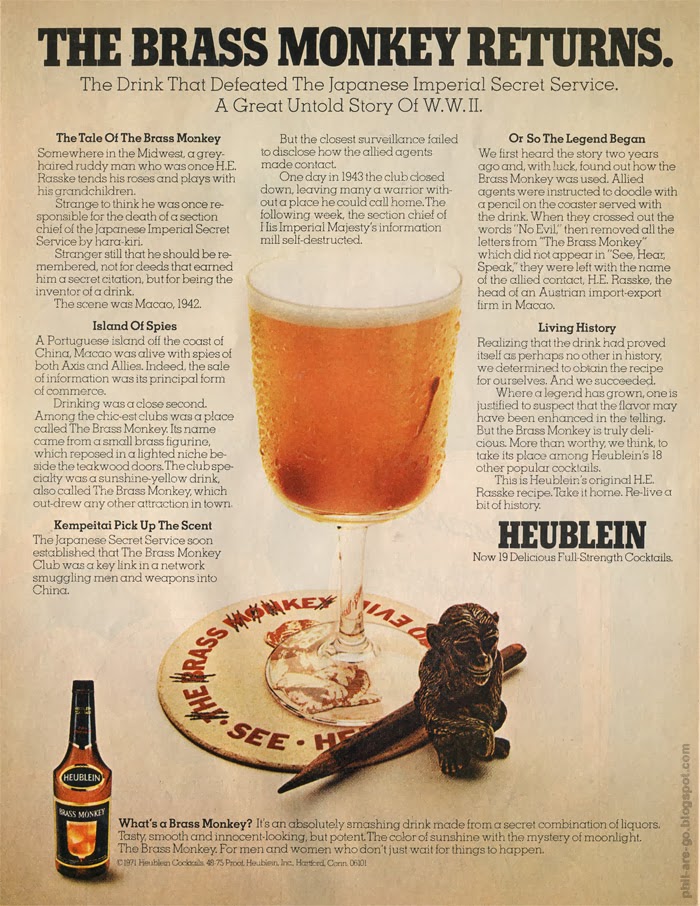SO, all you scholars, where did “Half past a monkey’s ass, quarter to his balls” come from? Is there more to the rhyme?
I’ve always heard it as:
“Half past the camel’s ass
A quarter past his balls
lift up the rear leg
and see niagra falls.”
But that was in 6th grade.
Best I can do is a usenet metalworking post.
I’d take that with a pinch of salt though until someonecan confirm that cannon balls would have been warmed. I couldn’t find any corroboration at the RN slang site, although as they say POSH is Port Out Starboard Home, that’s probably a good thing  .
.
Arrgh. Posted too soon. Snopes refutes the brass monkey element of the Usenet explanation, so the whole house of cards comes tumbling down.
Hmm. Warming cannon balls to be inserted into a (typically already hot , if it had been fired) cannon, to sit on top of cloth flammable wadding and gunpowder.
Considering how much effort they devoted to swabbing the cannon barrel with water to cool it so it would not cause premature ignition of the powder, I really have to doubt that aspect of it.
Besides, what would warming do to improve “predictable characteristics?” Arguably if the ball expands it would fit more snugly in the barrel, but if it fit too snugly, that wouldn’t help matters at all. Making sure the balls were case well and kept as smoothly-surfaced as possible would probably be the best expedient available to ensure no eccentricity was introduced – but cannons were hardly pinpoint-accurate sharpshooting weapons at the best of times.
Heated cannon shot was used. And well documented.
I haven’t thought of that expression in decades. Until reading this, I was still under the childhood belief that it was “according to his balls”. What a maroon.
Related question: what is the origin of the British slang “Couldn’t give a monkey’s…”? Is it a variant of “couldn’t give a rats ass?”
It’s possible those were the words among your peers. These oral traditions have a way of being mangled over time, especially when it involves school kids who are especially known for mishearing or creating their own twists, especially when it’s nonsense, and they end up with myriad variations (see, for example, the many variations of what little boys are made of: “X and snails and puppy dog tails.” I’ve found at least ten variations for X, with “snips,” “snakes,” “frogs,” and “slugs” being the four most popular.) Over here it was “half past monkey’s ass, quarter to his balls” with no “a” between “past” and “monkey.”
what is the origin of the British slang “Couldn’t give a monkey’s…”?
[NSFW or at last for the prudish] Something tells me it was originally “a monkey’s toss” - quite why that was considered so very worthless, I have no idea. Nor whether there’s any relation to the not uncommon usage “brass monkey’s”, for cold weather (meaning “cold enough to freeze the balls off a brass monkey”).
Eric Partridge gives two versions. This ![]() is one; the other is "A monkey’s fuck.
is one; the other is "A monkey’s fuck.
Monkeys must have had a bad rep when these were coined, I guess?
j
YouTube has documented the fact that monkeys are capable of being massive assholes. I think they still have a bad rep. It’s no surprise that idioms like that would pop up.
Were brass images of monkeys ever a thing? Maybe the person who coined the phrase knew about the cannon balls, but was thinking about an actual monkey. In the words of the Tootsie Pop commercial, “the world may never know.”
A brass monkey is a classic cocktail, here’s a 1971 advertisement for a bottled version of it.
By the way, there is an actual brass monkey in the ad.
I’ve also heard it as “a tinker’s cuss”, which at least has some sense of worthlessness.
FWIW any rhyme based on “ass” is unlikely to be of British origin as we say “arse”, unless it’s about donkeys.
The cannonball warmer explanation is very obviously fabricated. Ships are movable objects. The situation “When the shadow ran long along the deck, almost reaching the cannonball storage it was late in the day” would depend on the orientation of the ship with respect to the sun.
Am I crazy or is everybody wrong on the Internet? I always thought the expression was “half past Mickey’s ass and a quarter to his balls” … like on a Mickey Mouse watch. That makes so much more sense than anything anybody else has ever said that I’ve seen.
That would make very slightly more sense, but I’ve only heard it as “monkey.” Green’s Dictionary of Slang dates the monkey phrase to 1996, which while it could be right for a printed source, my 80s childhood definitely attests it to at least that decade orally. Plus it didn’t ’t mean “half past midnight” but was just a jocular answer to “what time is it?” in the way “time to get a watch” would be.
Oh, I just noted that entry omits the “quarter to his balls” part.
What time is it? Looks at wrist “freckle past a hair”
Of course it loses it’s impact now, because everyone looks at their phone.
And Monkeys ain’t mentioned. Ass or no.
It’s a monkey puzzle, for sure.
